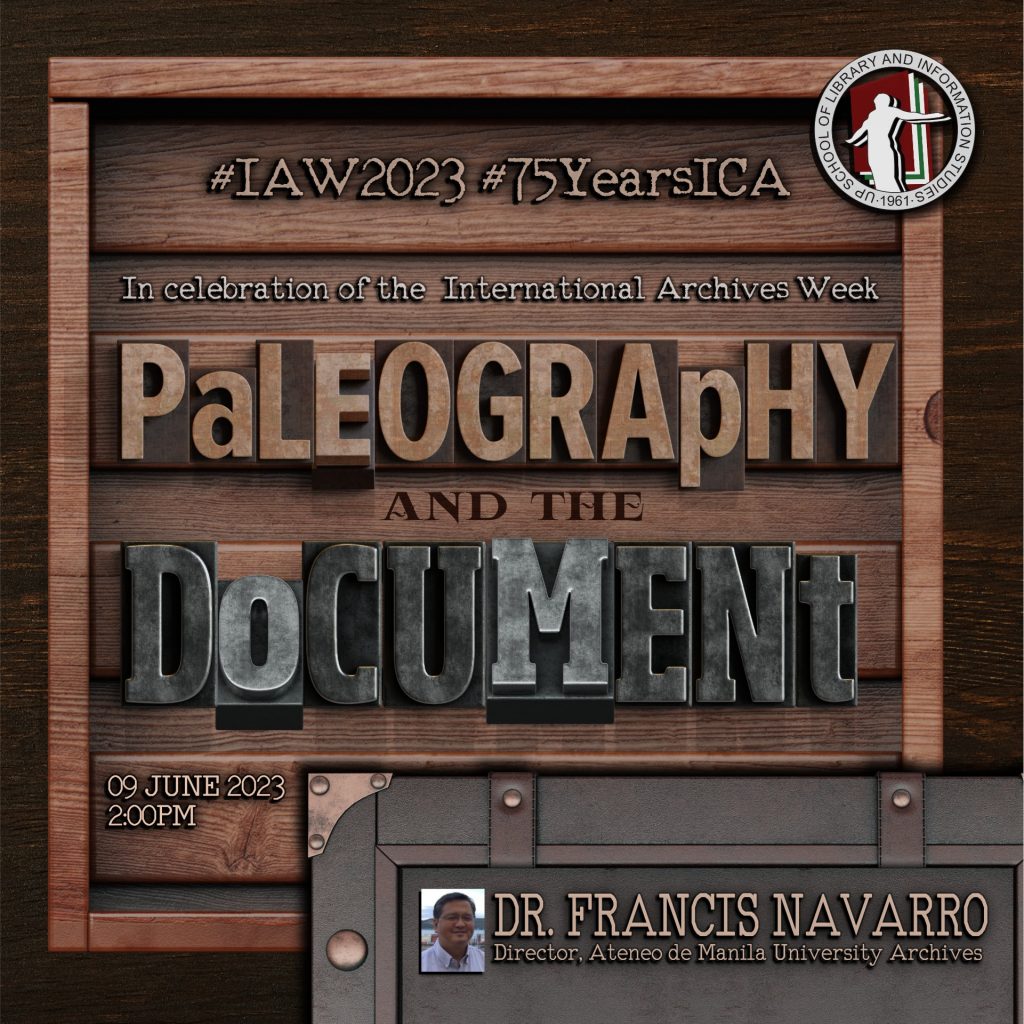
- This event has passed.
Paleography and the Document

𝗟𝗲𝗮𝗿𝗻 𝘁𝗼 𝗿𝗲𝗮𝗱 𝗦𝗽𝗮𝗻𝗶𝘀𝗵 𝗿𝗲𝗰𝗼𝗿𝗱𝘀 𝘄𝗶𝘁𝗵 𝗗𝗿. 𝗙𝗿𝗮𝗻𝗰𝗶𝘀 𝗡𝗮𝘃𝗮𝗿𝗿𝗼, 𝗗𝗶𝗿𝗲𝗰𝘁𝗼𝗿 𝗼𝗳 𝘁𝗵𝗲 𝗔𝘁𝗲𝗻𝗲𝗼 𝗱𝗲 𝗠𝗮𝗻𝗶𝗹𝗮 𝗨𝗻𝗶𝘃𝗲𝗿𝘀𝗶𝘁𝘆 𝗔𝗿𝗰𝗵𝗶𝘃𝗲𝘀. #𝗜𝗔𝗪𝟮𝟬𝟮𝟯 #𝟳𝟱𝗬𝗲𝗮𝗿𝘀𝗜𝗖𝗔
Reading old Spanish records located at the archives and in various libraries in the Philippines is not the same as reading maybe an old letter or newspaper written in Spanish. Aside from having to familiarize oneself with a new set of words, one would have to adjust to such things as understanding and knowing the parts of a document during a certain period, old handwriting, unfamiliar abbreviations, misspelled words, ink blotches, and torn pages.
Using tools such as paleography to identify terminologies, abbreviations, and writing styles that will be used throughout the Hispanic world from the 16th until the 19th century, researchers are faced with the primary problem of knowing to read, write, and understand Spanish especially as there is no specific and unified form of writing. The objective of this presentation is to explain the background of old Spanish records and to aid potential researchers interested in this particular period of the country’s history with an opportunity to extract vital information from these records.
This lecture will be held online on 09 June 2023 at 14.00 UTC+8. The event is free and open to all, however pre-registration is required to manage the capacity of the Zoom meeting. Register to the event at https://bit.ly/IAW2023UPSLIS
𝗔𝗯𝗼𝘂𝘁 𝘁𝗵𝗲 𝘀𝗽𝗲𝗮𝗸𝗲𝗿
Dr. Francis M. Navarro is a graduate of the University of the Philippines at Diliman where he took his Bachelor of Arts degree in History. He pursued higher studies at the Universidad de Salamanca as a scholar of the Spanish government where he took his Doctorate in Archival Studies and Documentation. Aside from being an Assistant Professor of History at the Ateneo de Manila University, he is also the Director of the University Archives which includes the Archives of the Manila Observatory and the Philippine Province of the Society of Jesus. He also gives classes at the Loyola School of Theology where he teaches Church History. In 2018, he was awarded by San Beda College, where he finished his elementary and high school education, as the Most Outstanding Bedan in the field of Arts and Culture. His most recent role was being a part of a government panel to study and investigate the First Easter Mass Celebration in the Philippines celebrated in 1521.
𝗜𝗻𝘁𝗲𝗿𝗻𝗮𝘁𝗶𝗼𝗻𝗮𝗹 𝗔𝗿𝗰𝗵𝗶𝘃𝗲𝘀 𝗪𝗲𝗲𝗸
This lecture is organized by the University of the Philippines School of Library and Information Studies (UPSLIS) in celebration of International Archives Week 2023. #IAW2023 celebrates diversity and collaboration of archives around the globe with the theme #ArchivesUnited. This year’s celebration is particularly auspicious as 2023 marks the 75th Anniversary of the International Council on Archives. The ICA was created under the auspices of UNESCO on the 9th of June 1948 to “to promote the management and use of records and archives, and the preservation of the archival heritage of humanity around the world, through the sharing of experiences, research and ideas on professional archival and records management matters, and on the management and organisation of archival institutions.” (International Council on Archives)
UPSLIS is an institutional member of the ICA and proudly offers the first Master in Archives and Records Management in the SEA region. For more information about the MARM program, please visit our website at upslis.info/studywithus.
Source: UPSLIS Facebook
